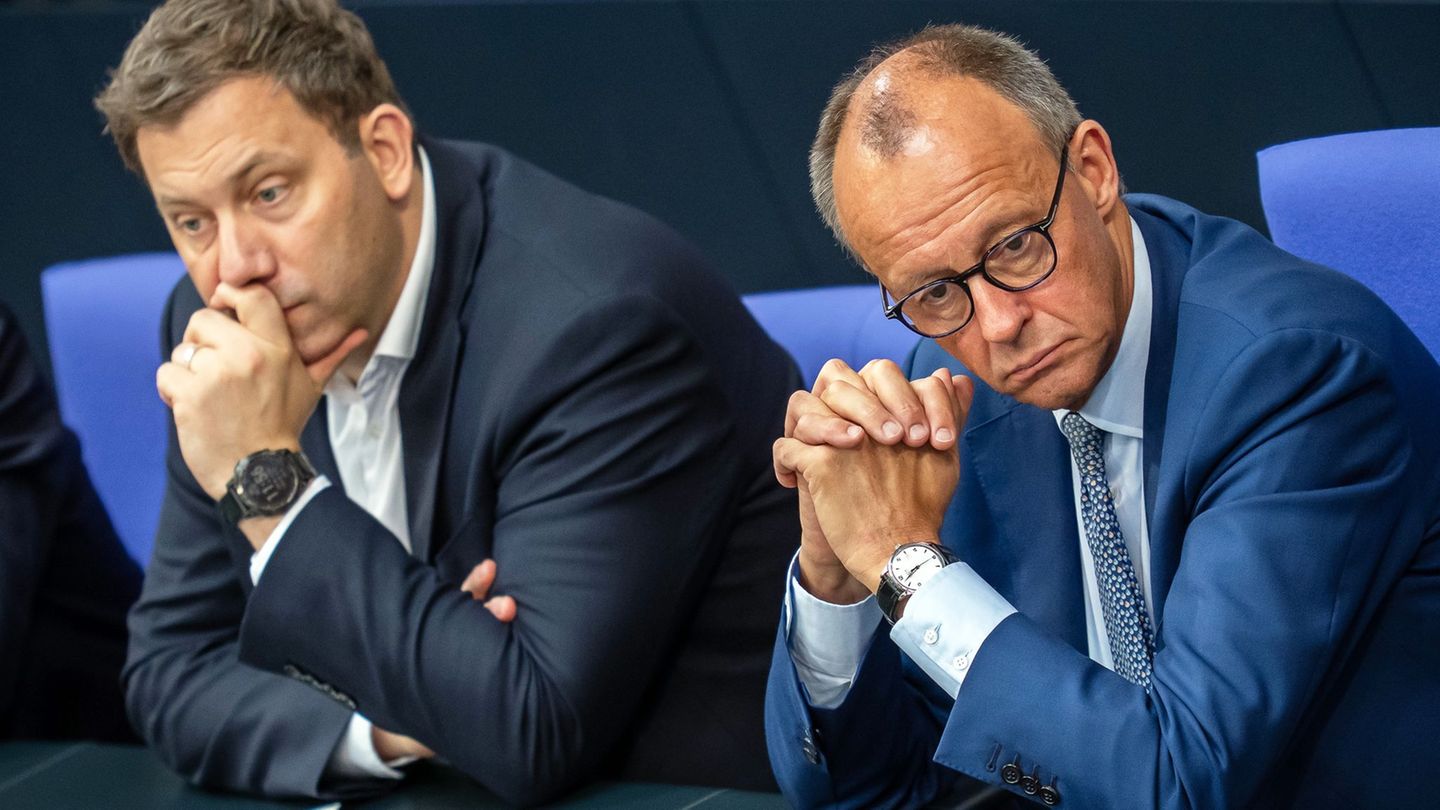Federal Constitutional Court
What is now at stake in the judge’s election
Copy the current link
Add to the memorial list
After the fiasco in the election of judges, there is great perplexity in black and red. How do you want to get out of there? The search for a solution is more than just the coalition peace.
Friedrich Merz had actually decided to establish a new, cooperative government style as a Chancellor. “We have to end the permanent public disputes of the past,” he had already set himself the goal before the Bundestag election. Since the burst election of three constitutional judges on Friday in the Bundestag, it has been clear that he initially failed with this claim. After a good two months in office, the black and red coalition in the most inglorious traffic light manner.
According to the fiasco, the Union is now focusing on cooling the heated debate about the SPD candidate Frauke Brosius-Gersdorf, which she refuses primarily because of its attitude towards abortions. “Now everyone should come down a little and then we will discuss the further procedure with the SPD in peace,” says parliamentary managing director Steffen Bilger (CDU). On September 10, the Bundestag will come together for its next regular meeting. A solution should be found by then at the latest.
The search for it is about a lot. It is not only the coalition peace at stake, but also the reputation of the Federal Constitutional Court, the ability of the Bundestag’s ability to act and the political fate of a leading coalition politician. What does that mean in detail?
Restoration of the coalition peace
If one coalition partner accuses the other public failure, the alarm level means red for a government alliance. This is exactly what the Vice Chancellor and SPD chairman Lars Klingbeil did on Friday from the lectern in the Bundestag. Leadership and responsibility are “not for Sunday speeches,” he said shortly after the broken judge election. “But if there are controversial votes here, then there must be leadership and responsibility. And that has to be shown.”
The search for an amicable solution is now becoming the first major test of the young coalition. Above all, lost trust has to be restored after the Union was not able to adhere to its commitment to choose the SPD candidate Brosius-Gersdorf.
Political future of Union faction leader Spahn
As the main person responsible for the fiasco, the Union Group leader is identified. Jens Spahn, of all people, who has so far been said to have a sense of conservative reflexes in the Union, underestimated the resistance in the Union against Brosius-Gersdorf.
In the masking affair, the former Minister of Health was able to rely on the backing in his own ranks. The attacks against him from the opposition were unanimously considered a campaign.
After the judge election, hardly anyone jumped aside on Friday and weekend. Even the lonely expression of solidarity by the North Rhine-Westphalian Prime Minister Hendrik, chairman of Spahn’s CDU state association, sounded a bit half-heartedly: “But it speaks for Jens Spahn’s character that he deals with it offensive and is looking for solutions,” said Wüst. “Jens showed humility and took responsibility. That is also political leadership.” Spahn has not yet publicly expressed itself.
View of the Federal Constitutional Court
Many consider the reputation of the Federal Constitutional Court to be damaged. SPD parliamentary group leader Matthias Miersch even accused the Union “the conscious dismantling of our highest German court and our democratic institutions. CSU interior minister Alexander Dobrindt sees it differently. “Everything that does not lead to a very specific result is automatically damage to the Federal Constitutional Court: I cannot agree with this perspective.”
So far, the occupation of judge posts has generally been clarified as noiselessly as possible between the big parties. It is about the highest German court, judges who, independently decisions of the government and parliament, should check their legality. Open political dispute about the occupation of judge posts does not fit.
The Bundestag’s ability to act
Ultimately, the search for a solution is also about the fundamental question of how capable the Bundestag is still in its current composition, in which the so -called parties in the middle – i.e. CDU/CSU, SPD and the Greens – no longer have a constitutional majority.
If the Bundestag cannot agree on the judges, the decision is transferred to the Federal Council. That would be the admission that the parliament is no longer fully decisive.
Four scenarios are now conceivable in the search for a solution:
Scenario 1: The SPD withdraws its proposal
This scenario would like the Union: The SPD clears the way for the search for a new candidate. The Social Democrats have already made it clear that this is out of the question. They praise the Potsdam constitutional lawyer Brosius-Gersdorf as “a highly respected lawyer who is technically beyond any doubt”, as the parliamentary managing director Dirk Wiese said. You see the allegations against the professor as a “agitation campaign”.
Scenario 2: Brosius-Gersdorf throws down
The hostility against Brosius-Gersdorf online, according to the SPD, went to death threats. In the end, the Potsdam constitutional lawyer could decide to retreat to protect herself. But then above all those who hostile them would have won.
Scenario 3: The Union still closes the rows
This is the scenario that the SPD wants. It was suggested from their ranks that Brosius-Gersdorf introduces itself in the Union faction in order to clear out concerns. The number of those among the 208 CDU/CSU MPs who have faced them should be around 60. The problem with this scenario: the judges are chosen in a secret coordination. Nobody can guarantee that enough Union people can go.
Scenario 4: The Federal Council decides
If the Bundestag does not find a solution, the decision can go to the Federal Council after certain deadlines. But a two -thirds majority is then also necessary there. And that’s why decision making there is not necessarily easier.
Information about the Federal Constitutional Court
dpa
Source: Stern
I have been working in the news industry for over 6 years, first as a reporter and now as an editor. I have covered politics extensively, and my work has appeared in major newspapers and online news outlets around the world. In addition to my writing, I also contribute regularly to 24 Hours World.




